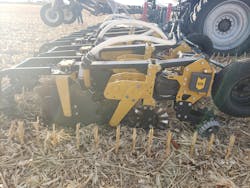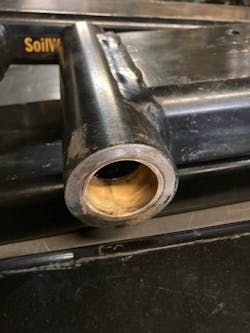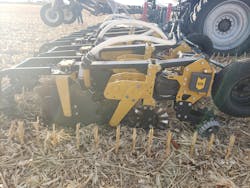Planting the Seed to Reduce Downtime
Unplanned downtime is an enemy in any industry. Most people associate the term with manufacturing, where a breakdown in machinery can lead to significant financial losses. The average cost of downtime across all businesses was $260,000 per hour in 2016, while downtime in the auto industry can cost $3 million per hour.
Downtime in the agriculture industry is harder to pinpoint. Untilled fields and unharvested crops reduce income, and it can frequently take days to repair equipment. In any business, time is money, and farmers who can’t plant and harvest their crops due to machine downtime are taking a financial hit. It is harder to get a precise figure on agriculture downtime, but downtime expenses are expensive and difficult to recoup.
One of the most pressing issues farmers face is corrosion, which can render equipment temporarily or permanently useless. Corrosion cost farmers $2 billion in 2013, according to the National Association of Corrosion Engineers. The harsh environment impacts nearly every piece of outdoor equipment, causing downtime and eating into the bottom line.
A new solution, however, can help stop corrosion and significantly reduce equipment downtime. A GKF shaft from igus, the Germany-based manufacturer of motion plastics, is a carbon alloy product that is an alternative to zinc and chrome plating corrosion inhibitors. The maintenance-free pivot from igus can be used in tractors, cultivators, planters, combines, and more.
GKF provides a hardened and corrosion-resistant running surface that will optimize the performance of the company’s iglide bushings. Previous attempts to prevent corrosion focused on applying coatings to components, which degraded rapidly. The igus shaft provides three times the corrosion resistance of zinc or chrome plating.
“It could be used in any piece of agriculture equipment that has pins in it,’’ said Nick Van Tol of igus, who helped develop the shaft. “It can also be used in construction equipment and we’re starting to find some interest in other industries, such as car washes, packaging, and even in the marine industry. Any place where corrosion is an issue, it could save money and reduce downtime.”
No Grease
Legacy designs are composed of a metallic bushing with grease grooves, a steel housing with grease fittings, and a steel pin. Farmers need to provide continuous maintenance. Grease and replacement parts are costly, and the external lubrication attracts dirt and debris from the environment. That creates a sandpaper effect on the bushing and pin, causing premature wear.
Scott Opsahl, a Senior Engineer for Environmental Tillage Systems in Minnesota, said farmers are required to spend an inordinate amount of time lubricating equipment. “The service manual recommends grease before each use,’’ he said. “On one piece of equipment, there were 5 grease points and 24 rows. It would take an hour or more to service it. What happened was nobody would service the equipment. We got a number of service calls and customer complaints.”
Besides the time commitment to maintain the equipment, farmers also needed to invest substantial funds into purchasing grease. That’s an especially important consideration in 2021. Suppliers announced in July their fourth price increase since January, averaging about 12 percent.
All igus components are self-lubricating, and the company’s products have been included in a wide range of agriculture products for decades. “There are a lot of advantages, including 8 times the service life with the bearings,’’ Van Tol said. “In agricultural applications, you need solutions that can stand up to rough conditions such as dirt, shock, and edge loads. The absence of external lubricants and long life are equally important.”
Fighting Corrosion
The self-lubricating components are critical in fighting corrosion, which is a significant problem for farmers. Dirt, dust, and moisture contribute to corrosion. Fertilizers and pesticides also lead to corrosion.
"Even in just ambient humidity, a little bit of moisture will cause a pin to corrode,’’ Van Tol said. “You can expect to see some corrosion even in a dry climate. On a hot day, you can see corrosion form. Corrosion inhibitors are applied, but it rubs off against the bushing. All of the corrosion is transferred to the pin.”
igus components have been incorporated into a number of agriculture products, including combine headers, a milking robot, and a fertilizer spreader. Energy chains, cables, and bearings from the company have been used in applications. Solving corrosion issues with bushings and shafts, however, has been an ongoing problem for Van Tol and many of his clients in the midwestern section of the United States.
“It was really frustrating,’’ Van Tol said. “We got all of the information and thought we’d solve it by changing the bushing. But it wasn’t the bushing. It was running on a pin that would corrode, and it changed the entire surface structure.”
Finding the Solution
Pin corrosion proved to be the biggest issue with traditional maintenance-free designs. Those designs included self-lubricating or fiber-wound bushing, and a steel housing without a grease fitting. The steel pin included a corrosion inhibitor, but corrosion protection for the housing was removed and the pin became a secondary wear surface due to the poor corrosion inhibitor. While the solution reduced manufacturing costs, the total cost of ownership increased due to the need to eventually replace the bushing, pin, and housing.
"What we would see is the pivot point would become stuck,” Opsahl said. “The farmer would have to stop what they were doing, get off the tractor, and wiggle it so it would move again.”
“The corrosion and degradation of the surface finish were not noticeable during continuous operation,’’ Van Tol added. “But once the machine was idle for a while, the corrosion expanded rapidly. In some instances, it caused the pivot to seize altogether.”
The solution to solve corrosion issues starts with the GKF shaft, which allows equipment designers to utilize a hardened and corrosion-resistant pin. The corrosion resistance is roughly 3 to 5 times better than zinc, nickel or chrome plating. “The corrosion-resistant layer is very difficult to wear past since it diffuses into the surface of the pin,’’ Van Tol said.
The shaft is paired with self-lubricating bushings, while a synthetic wax-based corrosion inhibitor protects the housing bore. “This is the most overlooked aspect of a maintenance-free pivot,’’ Van Tol said. “Not only does it protect the housing from corrosion, but it also assists in maintaining a press fit for the bushing.”
The solution significantly reduces the lower total cost of ownership, as there is very little downtime due to routine maintenance of the individual pivots. The bushing becomes the wear surface and the sacrificial portion of the pivot. The housing will likely not need to be replaced during the normal lifetime of the unit.
Fewer Service Calls
Since Environmental Tillage Systems changed the design of its equipment, its customer service calls have been dramatically reduced.
“As long as the product works the same, that’s really what farmers care about,’’ Opsahl said. “If they don’t have to call for service and as long as it’s covered under warranty, that’s what they want to know.”
Opsahl has worked on agriculture machinery for about a decade, and when he started working on a new design for the tiller, the GKF shaft was one of the solutions he investigated. It has been beneficial in keeping the company’s equipment up and running.
“I wanted something that was not metal on metal and doesn’t have to use grease but will be just as durable over the life span of the product,’’ he said. “The GKF shaft helps make the product more durable and increases the life span. Now our pivot points are lasting longer, and our customers are happy.”
Thomas Renner writes on manufacturing, building, construction, and other trade industry topics for publications throughout the United States and Canada.


